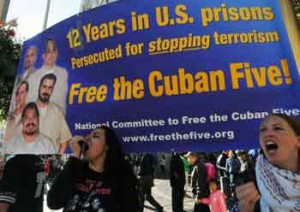Independent Vermont Senator Bernie Sanders’ recent trips to Iowa, New Hampshire, and South Carolina have ramped up speculation that the self-described democratic socialist is seriously considering a 2016 run at the presidency. His national tour appears designed to engage a grassroots constituency base and line up the support necessary to give centrist political juggernaut Hillary Clinton a run for her money.
But the far more charismatic and popular Democratic populist, Massachusetts Senator Elizabeth Warren, has dominated recent speculation about her own presidential ambitions after trips this Fall to stump for Democratic senate and gubernatorial candidates in Iowa, Minnesota, and Wisconsin.
These visits, perhaps not so coincidentally, come hot on the heels of a national book tour this summer promoting a new memoir that situates her aggressive economic justice agenda in the context of her lived experiences as a woman, mother, and grandmother.
Either Sanders or Warren would be welcome challengers to the Democratic establishment pick, and a fresh, dynamic, outsider campaign by either one could do more to force Hillary to watch her back than many pundits are willing to admit.
But there is a real risk of dividing an already weak and fractious electoral Left if both potential candidates were to run campaigns independent of one another.
To avoid that problem, social movement actors serious about using the presidential race as a tool to advance a democratic justice agenda against surging economic inequality should actively promote a joint Warren/Sanders ticket. This is the Left’s best opportunity to engage in the 2016 presidential elections in a way that both shifts the political narrative and moves the public debate to terrain more favorable to our demands.
Sanders and Warren are each heavy-hitters in their own right, but the combined star power of both leaders standing together, crisscrossing the country in a united electoral front, could galvanize a powerful coalition of grassroots constituencies under one banner, minimize the risks of an unnecessary and costly competition between the two, and pull in new layers of everyday people into the movement orbit.
The obvious bread-and-butter platform is both simple and popular:
- Create millions of livable wage jobs.
- Forgive student debt and reduce rising tuition costs.
- Win single-payer health-care.
- Curtail the corrosive influence of big money in politics.
- Expand and strengthen Social Security, Medicare, and Medicaid.
- Bust up big banks and big agribusiness.
- Tax carbon emissions and other sources of corporate pollution.
- Make sure big corporations and the 1% pay their fair share of taxes.
A joint ticket approach would also make it more likely that the money, organization, and national network were all in place early on to mount a full-fledged ground game assault in early caucus and primary states like Iowa, New Hampshire, and South Carolina.
Although either Sanders or Warren could probably, on their own, raise enough money to build the necessary organization to run a national campaign, a unified ticket approach would make the task much easier and could return far bigger dividends. The double team offense could electrify a grassroots base of activists inside already existing movement infrastructure, not just to canvass and work the phones, but also to organize town hall meetings, presidential forums, and direct actions.
If done correctly, this could also serve another benefit by plugging new layers of supporters into long standing community organizations, worker centers, peace groups, and labor unions; rather than solely being sucked into the traditional Democratic party apparatus, as is the case in most elections.
Lastly, if the Sanders and Warren camps join forces it would prevent a worst-case scenario where both were to run independently of one another, dividing the electoral Left, splitting scarce financial and movement resources, and all but guaranteeing a primary win for Clinton.
But although the potential rewards are high, a joint ticket approach is also not without its own risks, and raises a series of significant questions that must be ironed out. These include: why should Warren headline the ticket ahead of Sanders? Under what party banner will the campaign run? And how exactly will it be used as a platform to build a stronger social movement independent of Democratic Party?
Why should Elizabeth Warren headline a joint ticket over Bernie Sanders?Â
As an outspoken, self-styled democratic socialist and career third-party and/or no-party independent, Sanders has nearly impeccable credentials for a politician. He is also eager to work with independent grassroots actors, as can be seen by his embrace in Iowa of the tough and tenacious, anti-establishment, people’s action group, Iowa Citizens for Community Improvement.
But Bernie’s age and gender could both be used by Hillary supporters to drive a wedge in the electoral Left, while his expressed political beliefs as a small “s†socialist could be easy fodder for attack ads. It is also unclear just how far his appeal truly extends and whether or not his message can be picked up outside of a narrow echo chamber.
Warren, on the other hand, has a much more formidable and broad base of support than Sanders, and her demonstrable impact on national policy debates has already forced Hillary into attempting to co-opt her message.
Indeed, after Warren recently came out swinging against the Obama Administration’s coddling of Wall Street big banks in an October 12 interview with Salon magazine, visited two Iowa cities on October 19, and changed her tune on a possible presidential run to People Magazine the week of October 20, Clinton was forced to veer populist during an October 23 stump speech in Minnesota and pay lip-service to reining in the big banks and protecting everyday people from predatory lending. This in turn set off a frenzy of renewed media attention and speculation about both women.
On the downside, Warren appears to be fiercely loyal to the Democratic Party, the “graveyard of social movementsâ€, according to some on the far left, and her perceived lack of experience in national politics could be used as a weapon against her in any attempted hatchet jobs by a Hillary-aligned Super PAC.
Like Sanders, Warren’s generally hawkish stance on the Israeli occupation of Palestine and US wars in the Middle East is also highly problematic, and without a dramatic change in tune could prevent antiwar factions from giving their critical endorsement to the hypothetical joint ticket campaign. Closing corporate tax loopholes and making the 1 percent pay their fair share doesn’t mean much if more than half of every tax dollar still goes to the Pentagon.
But given all these considerations, a Warren/Sanders ticket, with the Democratic populist receiving top billing ahead of the democratic socialist, would be by far the strongest formation, with Sanders’ supporting role as an experienced independent and elder statesmen giving Warren key credibility among some movement actors skeptical of party Democrats.
What party banner should the joint ticket run under?
Whether to run a joint campaign as a third party, no-party, or as Democrats is a somewhat muddier river to wade, but at the end of the day the answer is largely obvious, if admittedly concessionary.
Even if Sanders were to run alone, the chance of him running as an independent or on a third party ticket appears slim, despite his career legacy as a political party outsider, because potential donors and supporters are both wary of playing a “spoiler role†similar to what Ralph Nader and the Green Party were accused of doing in 2000 (for the record, the Supreme Court stole that election and should bear sole blame for the outcome).
Running outside the political party structure could also waste scarce movement resources on ballot access fights, money better spent reaching out to voters, and could exclude both Warren and Sanders from primary debates where they can go head-to-head with Hillary in front of millions of everyday Americans.
On the flip side, running the joint ticket in the Democratic primary could isolate some idealistic leftists who are unafraid of playing a spoiler role but who may assume Hillary will win regardless and are worried about legitimizing a party that is nearly as corporate as the GOP.
Lastly if the sole outcome of a Warren/Sanders primary run were only to bring more disaffected people back into the folds of a centrist Democratic Party tent, then the whole exercise would be for naught. However, it would be an entirely different question if they were to lose but still move the goalposts and put points on the board for a populist agenda.
How will this campaign prioritize principles and people over parties and politicians? Â
Perhaps the most important question to consider is how a united front ticket could be used not just to move Hillary to the left before the general election, but how it could be used to upend the whole political calculus by actually beating Clinton outright, while at the same time strengthening and building a real mass movement from below.
The key here is to never underestimate the populist sentiment of the American electorate, however unorganized, regardless of their party affiliations, or the power of face-to-face retail politics. A strongly populist, anti-corporate message resonates with broad sections of the general public, including young people, women, immigrants, African-Americans, and rank-and-file Tea Party Republicans alike. Although both Hillary and any number of GOP candidates, from Scott Walker to Jeb Bush to Mitt Romney, would all outflank an insurgent Warren/Sanders campaign with big money television ads, it is possible for organized people to take on organized money and win.
Nowhere is this more true than in early voting states like Iowa and New Hampshire. Iowa is a Middle America state where Hillary failed to perform (she placed third in 2008 behind Obama and John Edwards, while Bill never bothered to contest Iowa in 1992). New Hampshire is an East Coast state where both Warren and Sanders hold as much of a home-court advantage as Clinton does.
The rest of the primary election map rests on the Warren/Sanders ticket upsetting Hillary early on and gaining enough momentum to carry the rest of the country through to victory, much like Obama did in 2008.
How does all this help build a stronger, fighting movement?
Sanders in particular, with both his words and his actions, has stressed during recent stops across the country that a president cannot govern without a mobilized population asserting our own demands and agitating for systemic change to big business as usual.
Although it is less clear whether Warren shares this same movement analysis, it is critical that the success of either a joint ticket or an individual run by either senator is ultimately measured by how well it builds independent and organizational political power outside of the traditional party structure, by bringing new layers of everyday people into a progressive-populist fold not already controlled by Democrats.
Such a lofty goal will require the joint campaign to collaborate with movement actors with a more transformational type of relationship than typical transaction politics. But an early model to build on for what this could look like in practice already exists in the successful relationship Sanders has built with Iowa CCI members in the first-in-the-nation caucus state.
At the end of the day, an individual run by either Elizabeth Warren or Bernie Sanders could pose a powerful challenge to Hillary Clinton and corporate Democrats. And if either were to pull off an upset they would stand as strong of a chance, if not stronger, of bringing independents on board and beating any GOP candidate in the general election.
But a joint ticket that harnesses and combines the Warren and Sanders forces together could be even more powerful still. Hillary will be forced to watch the throne either way, but a real coup is more attainable with a tag-team approach that integrates the best that both Warren and Sanders have to offer.













